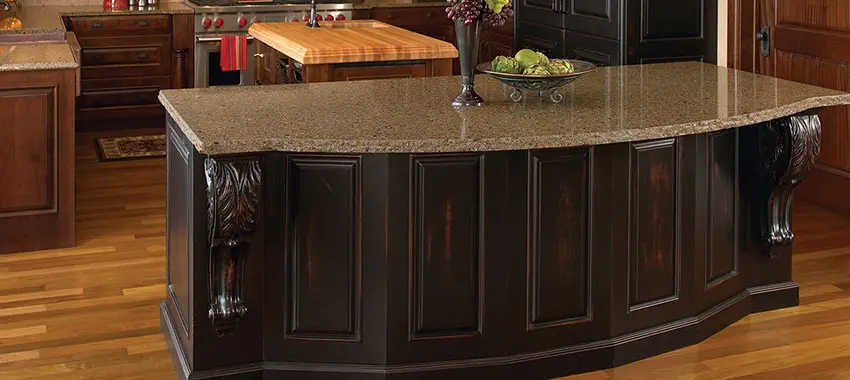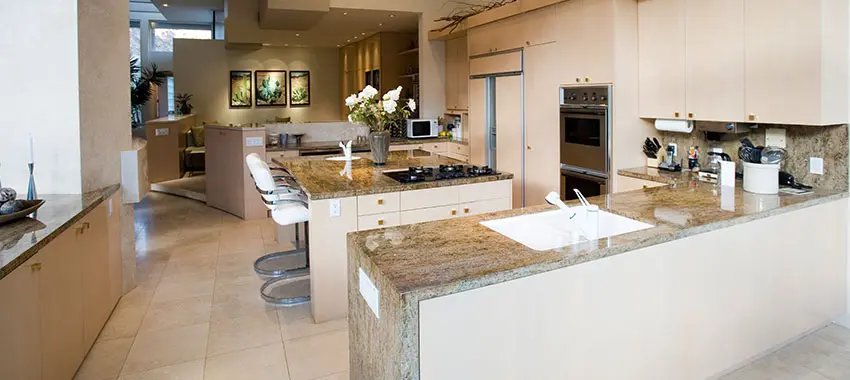Jul
Do Granite Countertops Stain? How To Remove And Prevent Stains
- 2024
- FlintStoneTops
Granite is one of the most popular countertop options out there, but the million-dollar question still looms over people’s heads before buying granite countertops is: Does granite stain? Here is everything you need to know about it.
Stains And Granite Countertops
Granite is a natural stone. Natural stones are porous. It means that they have lots of tiny holes on the surface of the stone that allow water and moisture to seep in.
This is something that can lead to stains and, sadly, granite is also in this category. There are many ways by which granite can get stained, but water and moisture are some of the most common elements by which you can ruin your perfectly good countertops.
Granite is naturally quite sturdy and durable, but these small holes can be the drawback of the beautiful material. There are a lot of stones out there that are porous and they need to be taken care of, otherwise, the surfaces are going to turn into a display of splotches.
Since you are going to be working in the kitchen, there is a high risk of granite getting exposed to spills and what not and getting stained. So, to keep your countertops looking beautiful for longer, something needs to be done about the porous properties of these stones. Here is what you can do.
How To Remove Stains From Granite Countertops?
Now that you know why granite countertops stains, you can get rid of any existing stains you have on your countertops with these tricks.
Use Dish Soap
This is a very simple solution, but it’s very effective and it will surprise you with its qualities. Dish detergent is the perfect thing to use on your countertops especially if there are stains on the surface of your granite countertops.
You just need some detergent. Drop a bit of it on the stain. You can use a wet washcloth or a toothbrush to gently brush the surface and it will get rid of the stain. Then, use a clean and slightly wet cloth to wipe the suds away.
Baking Soda To The Rescue
If the stain is a bit pesky and it’s not going away with a detergent, then don’t worry because baking soda is going to get the job done. You will need some baking soda and some water.
Make a pasty solution and apply it on the surface of granite countertops where there are stains. Leave the solution for a few minutes and then use a wet washcloth to wipe everything away. The stain will go away like it was never there.
Use A Soft Toothbrush
For dried-up food crumbs that are stuck to the surface of the countertops, you don’t want to scrape them with a metal scraper. This might lead to scratches and you don’t want that. Instead, use a wet toothbrush with a bit of detergent and go over the food stain back and forth. It will eventually lighten and you can repeat it a couple of times until the stain is gone for good.
It’s an amazing way to clean up those stains that are pretty much permanent, but you won’t scratch up your granite countertops, so that’s an amazing thing.
Be Gentle When Using A Food Scraper
Food scrapers can be tricky to use, especially on granite which can be prone to scratches if you’re not too careful. This is why you want to use a plastic scraper and you want to use it ever so gently on the granite countertop surfaces.
Try to wedge the scraper on the top of the food stain to get rid of it for the most part and then you can use a soft toothbrush to go over the stain until it’s gone. You might think that it’s a lot of work, but you’ll save your countertops from getting scratched deeply.
Use Store-Bought Cleaners
If you want to get rid of a stain like oil, then you will need something a lot more powerful and this is where special cleaners come in handy. Try to get ones that are safe for use on granite countertops and also take a look at the pH of the cleaner because you don’t want to go for something acidic or that has a lot of harsh chemicals as it will ruin the countertops.
Use the cleaner as per the instructions and you’ll see that your countertops will be free from stains for the long haul.
How To Prevent Stains On Granite Countertops?
Here are some things you can try to prevent stains from forming on your granite countertops.
Sealing Is The Way To Go
The number one way of ensuring that your granite countertops remain in pristine condition and don’t stain is by sealing them. Sealing countertops, especially natural stone countertops, is important because it closes off the pores of the stone and it also prevents water, moisture, or any liquid for that matter, from seeping into the material and ruining it.
So, before or after the installation, you’ll need to seal your granite countertops with a sealant and that’s going to prevent stains in the long run. It’s also something you’ll need to redo every couple of years to ensure your granite island or countertop stays stain-free.
Regularly Clean The Countertops
Another thing that can make your countertops look brand new and prevent stains from becoming permanent is regular cleaning. If you’re not a fan of cleaning your countertops after winding down for the day, then unfortunately, you might ruin your countertops by yourself.
You need to make it a habit to clean your countertops every single day. This prevents anything from drying up on your countertops and it’s also more hygienic. So, as soon as you’re done for the day in the kitchen, clean the countertops. You’ll thank yourself later for taking good care of your countertops.
Use A Cutting Board
Fruits, vegetables, and meats can also make your countertops stain like there’s no tomorrow. Juicy and citrus-y fruits will make your countertops stain and they can also become permanent, especially if you’re cutting things up directly on the surface of the countertops.
This is why you need to invest in a good quality cutting board and use that for cutting up foods and meats. You’ll save your countertops from becoming a scratchy mess and it’s also handy for other things like handling hot pots and pans.
Avoid Water Damage
Since you’re in the kitchen, this can be hard but, you need to ensure that you’re not getting granite countertops wet, especially if sealing them is long overdue. You want to wipe any water or spills right away and you also don’t want to keep the surfaces sopping wet because that’s where the damage begins and the water can eventually find its way into the material and it can ruin your perfectly good countertops. So, even though water is harmless per se, you don’t want it to get too close to your countertops.
Conclusion
Granite will stain since it’s a natural rock, but there are ways to rectify the problem. Sealing and daily cleaning are the best solutions. You can seal granite countertops yourself, but if you need an expert, contact granite installers Potomac.



